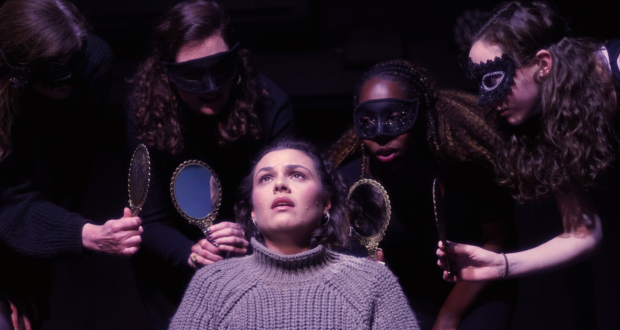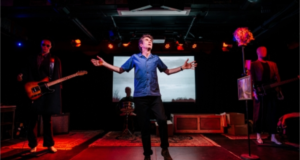These plays begin to explore their subject matter but could go further to represent these spaces dynamically. Summary
Rating
Good
How are relationships forged and pushed in areas of confinement? This is a question that Daybreak Theatre Company explores in Enclosed Spaces at Golden Goose Theatre.
The production is comprised of four short plays, written and directed by Annie Knox and Kia Kielty. All are set in confined areas: a ladies’ toilets, a waiting room, a broken-down lift, a woman’s mind. Whilst these spaces were represented in an enclosed auditorium, the performance space could be better used to further explore the tensions and moments of connection that arise between people in close proximity.
The first of the four plays is Waste. In a hospital waiting room, two characters are trapped in conversation with one another. Through their interactions, the performers, Knox and Alex Miller De Luis, display strong characterisation through their use of gesture and facial expression. Their costumes are consistent with this and help imply the characters’ backgrounds and personalities. Communicating essential information via visual cues is particularly useful in short plays, where every minute must be used cleverly. Whilst the play did well to utilise costume in this way, the story still felt longer than necessary, and would have been more powerful had it finished sooner.
The context of Waste is revealed through action. When the play begins, it is clear that things are not as they seem; however this does not feel entirely deliberate. The play would benefit from an added strangeness, perhaps through a more considered set or dynamic staging, to confidently announce the absurdity of its context, even before what is actually happening is confirmed in the dialogue.
The second play, Lift, explores a dramatic confrontation in a broken-down elevator. Chris Clynes‘ performance as Alex brings humour and tenderness to the stage, and it would have been exciting to see a further display of Clynes’ skills had the character of Alex evolved more throughout the play. Although in a lift, the performance space used was still sizeable, and the piece could have achieved greater tension if performed in a more limited space.
Varsha Patel’s performance in the third play, Mirror, was convincing, adequately displaying a woman trying to maintain control as she battled intrusive thoughts. However, the staging of this play was unoriginal, and the issues explored are more nuanced than the script and direction allowed for.
The final play, Cubical, was the most entertaining. Set in the ladies’ bathroom of a nightclub, the space offered potential for exciting relationship dynamics to be forged and explored. This play follows a conversation between two women of different generations, exploring how confinement offers unexpected but intriguing moments of connection. Whilst the dynamic explored felt original and wholesome, some of the dialogue felt forced and could benefit from refinement. Additionally, the implication of the ending – the younger woman finding the courage to leave and the older remaining where she is, still finding comfort in the tiny bottles of alcohol she had hidden hilariously throughout her outfit – felt unequal.
The staging of Cubical was engaging but could be made more dynamic by exploring the fact that the main characters could not see one another throughout their conversation. It would be interesting to see how this exploration could further evolve the performance.
Whilst exploring its settings adequately, Enclosed Spaces could benefit from some further development. It could go further with its themes, perhaps by arranging the audience in the round to entrap the scenes in greater confinement. This staging would offer new possibilities to develop the action and characters onstage, and force the creatives to consider more deeply their use of transition between these spaces and how they are tied together.
Written and directed by: Annie Knox and Kia Kielty
Produced by: Daybreak Theatre Company
Enclosed Spaces plays at Golden Goose Theatre until 7 May. Further information and bookings can be found here.
 Everything Theatre Reviews, interviews and news for theatre lovers, London and beyond
Everything Theatre Reviews, interviews and news for theatre lovers, London and beyond



